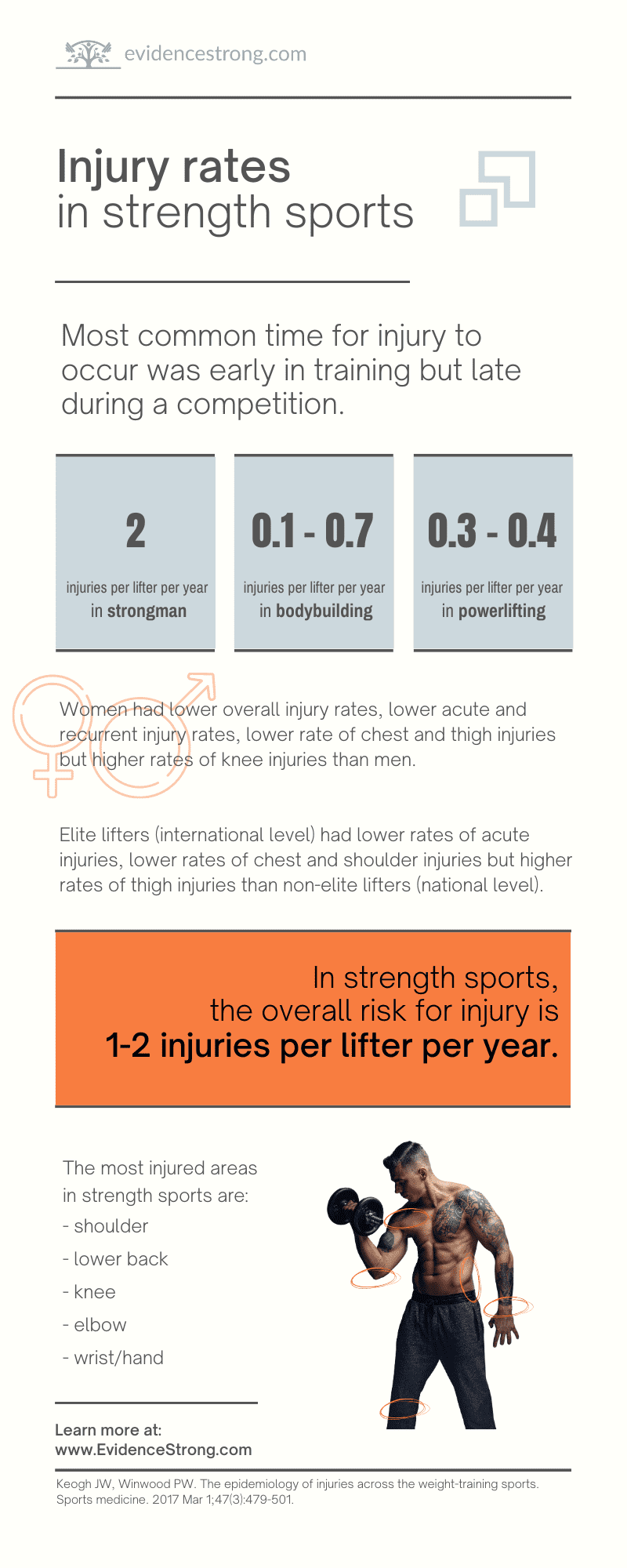Summary of a review article on injury rates in different strength sports such as weightlifting, powerlifting, CrossFit, bodybuilding, strongman and Highland Games.
Who
Athletes participating in weightlifting, powerlifting, bodybuilding, CrossFit, strongman, and Highland Games.
Design
Systematic review of 20 epidemiological studies.
- Weightlifting: 8 studies
- Powerlifting: 6 studies
- Bodybuilding: 4 studies
- CrossFit: 2 studies
- Strongman: 1 study
- Highland Games: 1 study
Outcome measures
acute injuries, overall injuries, chronic injuries, recurring injuries, location of injury, type of injury, severity of injury
Main results
Acute rates of injuries were higher (26-72%) than chronic (25-50%) in weightlifting, powerlifting and strongman.
Most common time for injury to occur was early in training but late during a competition.
Women had lower overall injury rates, lower acute and recurrent injury rates, lower rate of chest and thigh injuries but higher rates of knee injuries than men.
Elite lifters (international) had lower rates of acute injuries, lower rates of chest and shoulder injuries but higher thigh injuries than non-elite lifters (national level).
Injury rates:
- overall: ~1-2 injuries per lifter per year / 2-4 injuries per 1000h
- bodybuilding: 0.12 - 0.7 injuries per lifter per year / 0.24 - 1 injury per 1000 h
- powerlifting: 0.3 - 0.4 injuries per lifter per year / 1.0 - 1.1 injuries per 1000h
- strongman: 2.0 injuries per lifter per year / 5.5 injuries per 1000 h of training
- strongman specific training had 1.9 times more injuries than weight training (e.g. squat, bench press, deadlift)
- Highland Games: 7.5 injuries per 1000 h of training and competition
Injury location:
- overall: shoulder, lower back, knee, elbow, and wrist/hand
- weightlifting: knee, lower back, shoulder
- powerlifting: shoulder, lower back, knee
- bodybuilding: shoulder, knee, lower back
- strongman: lower back, shoulder, biceps
- Highland Games: shoulder, knee, lower back
- CrossFit: shoulder, lower back, knee
Injury type:
- overall: strains, tendinitis, sprains
- weightlifting: strains, sprains, tendinitis
- powerlifting: strains, tendinitis, arthritis
- bodybuilding: sprains, tendinitis, cartilage degeneration
- strongman: strains, tendon injuries, ligament sprains or tears
- Highland Games: tendinitis, strains, cartilage damage
Reasons for injury quoted by athtletes:
- weightlifting: tiredness/fatigue (60%), technical error (31%), excessive overload (21%)
- bodybuilding: fatigue (21%), excessive overload (18-35%), insufficient preparation (14-42%), lack of spotting (7%)
- strongman: technical error (25%)
For strongman:
- higher rate of competition injuries among younger than athletes aged above 30 years.
- lower rate of competition injuries among lighter weightclass athletes than above 105 kg weight class.
- athletes in >105 kg weight class had less severe and moderate injuries than lighter athletes.
- athletes aged above 30 years had twice as many severe injuries as younger athtletes.
Take home message
Original article
Keogh JW, Winwood PW. The epidemiology of injuries across the weight-training sports. Sports medicine. 2017 Mar 1;47(3):479-501.
